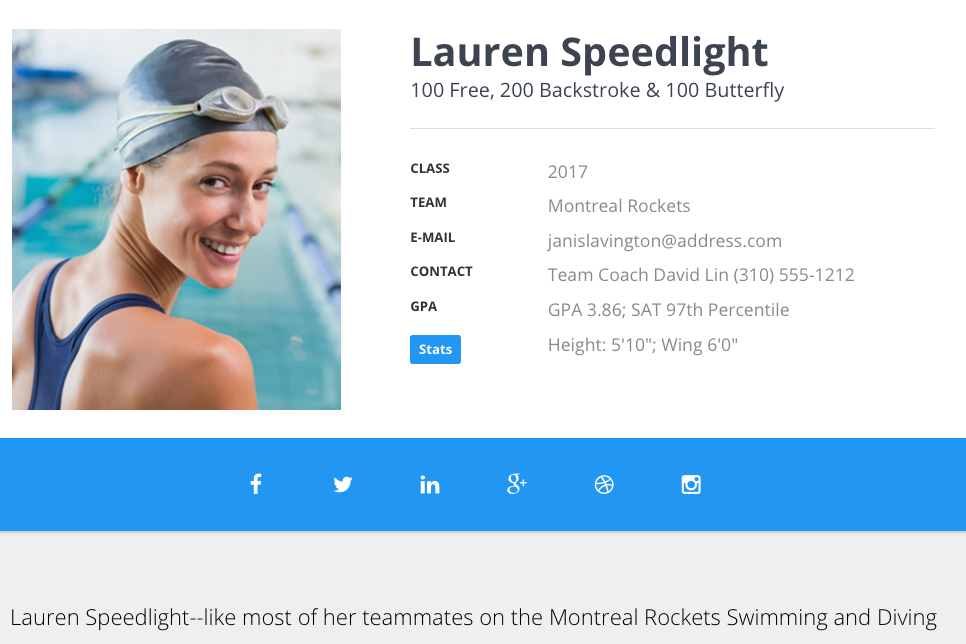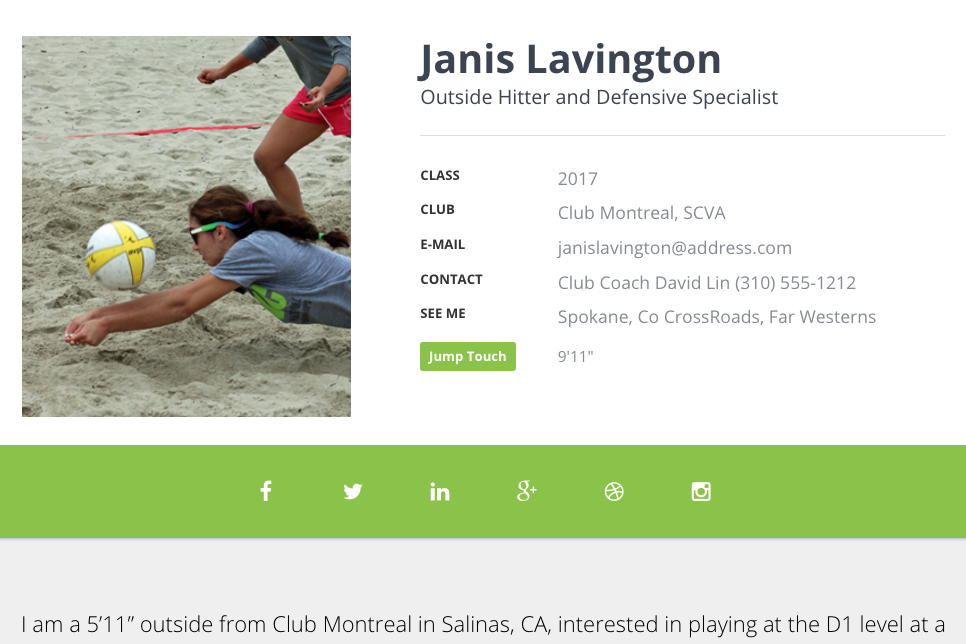If you’re a high school athlete looking to play NCAA softball in college, the first step toward getting recruited is familiarizing yourself with recruiting rules and processes. Keep reading for an overview of the softball recruiting process and tips on how to help stand out to NCAA college coaches. Once you understand how softball recruiting works, you’ll be more confident that you are doing everything in your power to get recruited and get that scholarship you've been dreaming of.
The College Softball Recruiting Process - A Step-by-Step Guide
- Initial contact from coach. The unofficial college Softball recruiting process begins a player's freshman year, when coaches make their rounds to tournaments and camps. The first communication begins either with an initial contact from the coach in the form of a “nonathletic recruitment publication” such as a questionnaire or a "form" email about a camp, or an email sent from a player to a coach expressing interest in their program. If you receive an email from a coach, you should know that college softball coaches and their recruiting teams might send out hundreds or even thousands of emails. If you receive one of these emails or letters and it includes a questionnaire, it’s in your best interest to fill out the questionnaire. But don't think that just because a coach sent you an email that he's strongly interested in you. Early in the process, coaches cast a wide net, and then narrow their sights as they move through sophomore and junior year.
- Base evaluations. After a coach makes initial contact, s/he’ll continue investigating potential athletes. NCAA coaches are not allowed to contact athletes directly their freshman, sophomore, and even into their junior year -- so he will conduct most research by searching online, visiting camps and showcase tournaments and possibly contacting the athlete’s coaches. The university coach will examine an athlete’s athletic and academic standings by looking at information such as class portfolio, test scores, GPA, game statistics, and performance records. If video footage of the athlete is available, the coach will almost certainly watch it. He/she might begin to rank all potential athletes, creating an ordered list of athletes to pursue in the recruitment process.
- Personal contact. Next, the coach and athlete will make personal contact by talking on the phone or in person. Depending on the NCAA Softball recruitment calendar, the coach may or may not be able to be the one to initiate contact with the athlete. With a face-to-face or over-the-phone discussion, the coach can get a better “feel” for the athlete as an individual so that he/she can assess the athlete’s character, attitude, and genuine interest in the Softball program. Phone calls and visitations from the coach may continue over the course of time as both parties continue to learn more about each other.
- Campus visit. After a number of phone calls and/or face-to-face meetings, the next step in the process is a campus visit. Campus visits help both the coach and player assess whether the university and its Softball program are right “fits,” while also exposing the athlete the university and team. If the campus visit goes well, the next step in the process is usually the extension of an offer from the university coach to the high school student athlete.
The Role of Travel Tournaments and Showcase Events
Softball recruiting, being a team sport, is subjective. Unlike individual sports like track & field, swimming, and golf, there are few normed metrics on which to base recruiting decisions. This is especially true in high school softball, where, even though stats are kept, there is too much talent variety in the spectrum between D5 and D1 schools for college coaches to rely on. So, in order to make wise recruiting decisions, a coach either has to see you play live, or depend on your video, or both. Coaches prefer to see players live at tournaments and showcase events, because there, they can evaluate a player 'intangibles': How do you deal with setbacks? What is your leadership like on the field? What is your general attitude?
Therefore, travel tournaments and showcase events are important pieces in the softball recruiting process. Here are just a few helpful links:
What If I Don't Live Nearby, or Am Unable to Attend Travel Tournaments?
If you live in a part of the country where attending travel tournaments is impractical or poses economic hardships, then you have two options. First, you can send college coaches video links every few months, or you can rely on a softball recruiting agency to get the attention of college coaches. Many Division II and most Division III colleges have more limited travel recruiting budgets than their Division I counterparts, so as long as you have a strong online profile where coaches can find your stats, scores, grades, and video updates, you'll be fine if you have limited travel means and are targeting these smaller colleges. All kids seem to be attracted to Division I schools, but the fact is that scholarships are limited and often it's easier to get merit-based scholarships at the DII, DIII, or even the Junior College level.
Are Recruiting Agencies Worth It?
Because softball recruitment can be overwhelming for parents and college admissions has become hyper-competitive for students, many athletic recruiting agencies have come out of the woodwork to assist all parties involved in the recruiting process. However, the value of the large, mass-market all-sports agencies is highly debated and the adoption of these services by both players and coaches across the country is inconsistent. Although recruiting agencies can be helpful, large recruiting companies can also put the athlete at risk by not representing them to the fullest or misunderstanding the athlete’s needs. Whereas some coaches say that they “trust [agencies’] judgements and will take a look at the athletes sent our way,” others say that they immediately delete emails from agencies and consider them “equivalent to spam.”
The problem with using mass-market recruiting agencies is that they generate more email to college coaches than the college recruiting coaches - or their assistants - can get through. See our article about trends in college athletics recruiting and remember that you have to find a way to stand out. You are far better off building your own online profile and contacting college softball coaches directly -- yourself, and/or using a small, personalized recruiting service that specializes in softball recruiting. But we warn you: agencies can be expensive, and it's unclear whether their outcomes are significantly improved over what an athlete can do themselves via direct contact with college coaches.
Greg Pereira, Founder, Athletics Recruiting
Facts About Softball Recruiting
Recruitment periods. Heavy recruitment for college softball begins on September 1st of junior year, at which point coaches are able to initiate contact with players and players are allowed to continue making “unofficial” visits to schools. For full details, view the NCAA’s college-bound athlete guide.
“Equivalency” status: Division I women’s softball is deemed an “equivalency” sport by the NCAA, meaning that softball coaches are granted a set number of full scholarships to distribute among multiple players as partial scholarships. Division I softball coaches are granted a total of 12 scholarships per team by the NCAA. See the 2015-2016 NCAA Division I Manual for more information. Often, these scholarships are indeed split up between players, and often, Division II or III schools are able to offer more in merit-based scholarships than a single player might receive in a D1 school. Talk to a lot of coaches, start the recruiting process at a number of schools, and keep your options open until all cards are laid out clearly on the table.
Female Sport: Softball was one of the first female sports sponsored by the NCAA, and nearly 1,000 universities support women’s softball programs through the NCAA. For more information about women’s participation in NCAA college athletics, view the NCAA Women’s Sports Inventory and Title IX resource center.
Commitments: Signing dates for college softball programs typically begin in November and go through August of an athlete’s senior year (yes, it can even happen that late).
With this in mind, it’s crucial that high school athletes seeking to play softball in college do everything they can to help themselves stand out and make the recruitment process easy for college coaches. By establishing an online profile with detailed academic and athletic information, an athlete simplifies the recruitment process for a coach. A softball player’s online profile should include all basic athletic and academic information and records, as well as video clips. For example, one Division III study by the NCAA concludes that 80% of coaches watch videos sent to them. For help setting up your own online athlete profile, contact us.
Why Do I Need an Online Profile?
Truthfully, you don't need an online profile but it is definitely an advantage. With the rise of mass-market recruiting agencies, college Softball coaches are getting more email than they have time for. Rather than digging through hundreds- even thousands of emails to piece together a recruit's grades, scores and transcripts, an online profile offers the advantage of presenting a coach with one central location they can go to for all your critical information. A tastefully done online profile shows the coach you put some time and effort into the recruiting process, and it makes it easier for college coaches to choose you above other players. So why wouldn't you utilize every advantage available to you?
Why Should I Include Grades and Test Scores Within My Profile?
Most colleges require that their athletics team maintain a minimum GPA -- and therefore, college Softball coaches favor high school athletes who show potential to help their team meet this requirement. For example, if a coach is considering two identical athletes during the recruitment process and one has a 3.4 GPA and the other has a 2.8 GPA, the coach will most likely make an offer to the athlete with a 3.4 first. Note that high school students must maintain a 2.3 GPA to compete during their freshman year of college for Division I sports; visit the NCAA’s 2point3.org website to learn more. With this in mind, it’s crucial that your online profile include academic details. In choosing an online profile tool, be sure to choose a platform that allows you to attach and post (not just state) your GPA and SAT/ACT scores. For safety, be sure that any sensitive information is password protected -- something we always ensure at Athletics Recruiting.
Conclusion
The college softball recruiting process can be competitive, but it’s also exciting. Your skills are clearly your most important asset -- however, your ability to package and showcase your scores along with your academic performance, is also crucial to your success. With the right online profile, you have a better shot at standing out to coaches and better your chances for getting recruited for their college Softball programs.
Our College Recruiting Websites Can Help Athletes Get Recruited:
 |
 |
 |